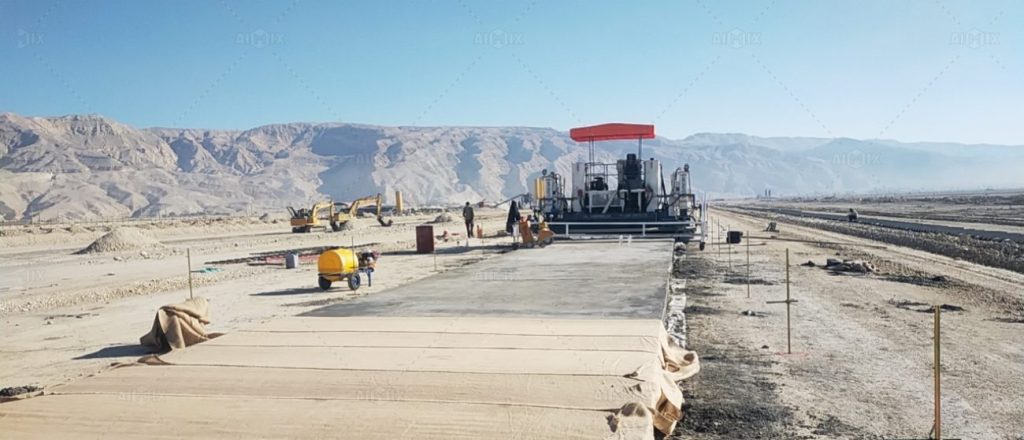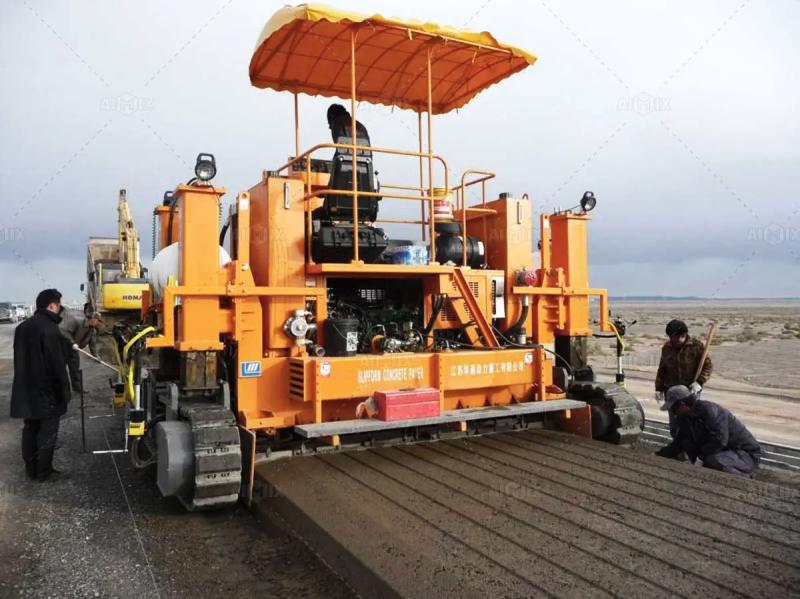In modern road construction, efficiency, precision, and quality are key factors that determine project success. Concrete paving is one of the most critical stages, and the use of a concrete paver machine ensures consistent layer thickness, smooth surfaces, and high production efficiency. However, to maximize productivity and project efficiency, it is essential to integrate concrete paver machines with other road construction equipment. This integration streamlines workflows, reduces manual labor, and improves overall construction quality.

The Role of Concrete Paver Machines in Road Construction
Concrete paver machines are specialized equipment designed to lay concrete uniformly for roads, highways, airport runways, and other infrastructure projects. They are equipped with mechanisms to distribute, level, and compact concrete, providing a smooth and durable surface. While concrete paver machines handle the paving itself, many other construction tasks—such as earthwork, material transport, and compaction—require additional equipment. Integrating these machines creates a seamless construction process that enhances productivity.
Key Road Construction Equipment Complementing Concrete Paver Machines
To achieve efficient paving operations, concrete paver machines are typically integrated with several supporting equipment types:
Concrete Mixer Trucks
Concrete mixer trucks deliver ready-mix concrete from the batching plant to the construction site. Proper synchronization between mixer trucks and the paver machine ensures continuous concrete supply, reducing downtime and maintaining consistent paving quality. Automated scheduling systems can optimize truck arrival times, preventing delays and minimizing the risk of concrete setting before placement.
Slipform Pavers and Screeds
While concrete paver machines handle general paving, slipform pavers or screeds can be integrated for specific tasks like edge finishing, lane markings, or variable-width paving. These attachments or companion machines enhance precision, especially on complex road sections, ensuring consistent thickness and smooth surfaces.
Material Transport Equipment
Front loaders, dump trucks, and conveyor belts play a critical role in transporting aggregates, sand, and other materials to the paver. By coordinating material supply with the paver machine’s operation, construction teams can maintain a steady workflow and prevent production bottlenecks. Mobile storage units or side conveyors can further optimize material handling on tight or high-traffic construction sites.
Compaction Equipment
After concrete is laid by the paver machine, compaction equipment such as rollers or vibratory compactors ensures proper density and surface uniformity. Integrating paver machines with compaction units allows operators to maintain a continuous process from concrete placement to compaction, enhancing pavement durability and reducing the risk of future cracks or settlements.
Laser and GPS Control Systems
Modern road construction increasingly relies on automation and precision control. Laser-guided systems and GPS-controlled pavers ensure that concrete is laid at the correct grade and alignment. When integrated with survey equipment and automated screeds, paver machines can maintain uniform thickness, slopes, and camber throughout the project. This level of precision reduces material waste and ensures compliance with design specifications.

Benefits of Integrating Concrete Paver Machines with Other Equipment
Integrating concrete paver machines with supporting road construction equipment offers several significant advantages:
-
Improved Efficiency: Continuous concrete supply, coordinated material transport, and synchronized compaction reduce idle time and accelerate project timelines.
-
Enhanced Quality: Proper integration ensures uniform paving thickness, smooth surface finishes, and precise alignment, minimizing defects and rework.
-
Labor Savings: Automation and coordination reduce the need for manual handling, decreasing labor costs and improving safety.
-
Cost Optimization: Efficient use of machinery and materials lowers overall operational costs and reduces project delays.
-
Sustainability: Proper integration minimizes concrete waste, fuel consumption, and equipment wear, supporting environmentally responsible construction practices.
Practical Considerations for Integration
Successfully integrating concrete paver machines with other road construction equipment requires careful planning and coordination:
-
Project Planning: Evaluate project size, paving length, and available resources to determine the optimal combination of paver, mixer trucks, compaction units, and auxiliary equipment.
-
Equipment Compatibility: Ensure that machines have compatible capacities, control systems, and operational speeds to maintain smooth workflow.
-
Operator Training: Skilled operators are essential to manage synchronized equipment operation, adjust settings, and troubleshoot issues on-site.
-
Site Layout and Logistics: Design construction site layout to allow efficient movement of trucks, loaders, and pavers, minimizing traffic conflicts and bottlenecks.
-
Maintenance Coordination: Integrated equipment requires coordinated maintenance schedules to prevent breakdowns and downtime.

Case Studies and Industry Examples
Several large-scale road construction projects have demonstrated the effectiveness of integrated equipment workflows. For instance, highway projects using laser-guided paver machines in combination with continuous concrete mixers and vibratory rollers have achieved:
-
Up to 30% faster paving rates
-
Uniform concrete thickness across multiple lanes
-
Reduced material wastage and lower fuel consumption
These examples highlight how integration not only improves efficiency but also enhances overall project quality and sustainability.
Conclusion
Integrating a concrete paver machine with other road construction equipment is essential for modern infrastructure projects. By coordinating concrete delivery, paving, compaction, and precision control, contractors can achieve faster, more efficient, and higher-quality road construction. This integration reduces labor costs, minimizes material waste, and enhances safety on-site. If you are looking for a reliable concrete paver supplier to get a suitable solution, you are suggested to check Aimix pavers and choose a right one for your road paving projects.
As technology advances, integration with automated control systems, GPS, and laser-guided equipment will continue to improve paving precision and operational efficiency. For contractors and project managers, investing in well-coordinated equipment workflows ensures that road construction projects are completed on time, within budget, and to the highest quality standards.